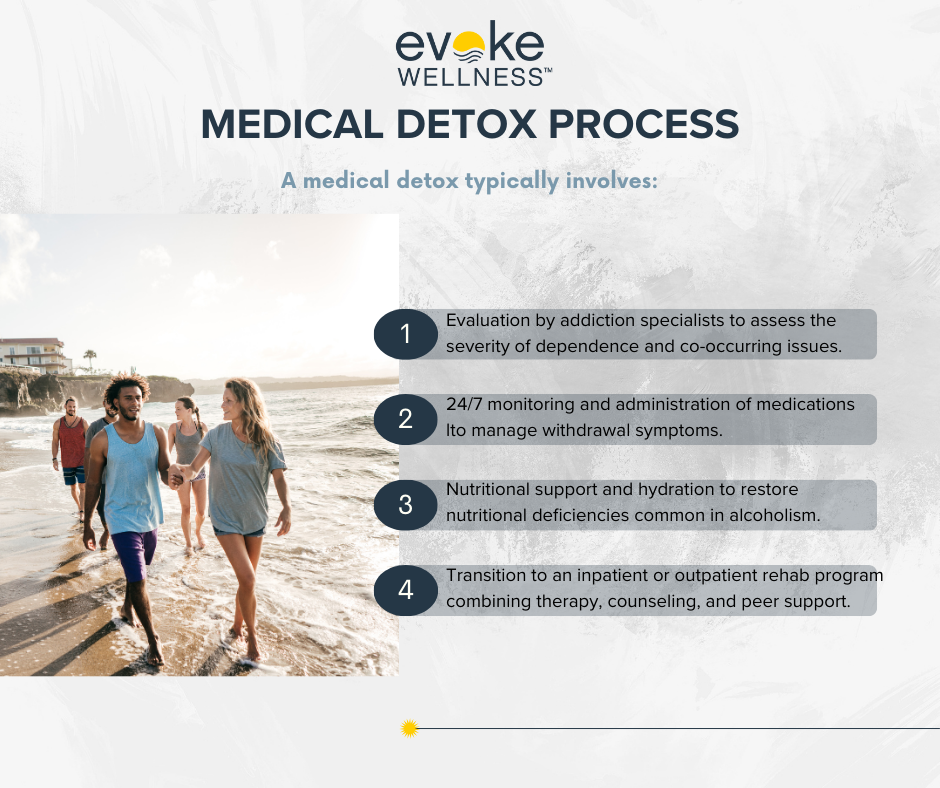Are you or a loved one struggling with alcohol addiction? The decision to quit drinking is commendable, but it’s crucial to understand the potential dangers of alcohol withdrawal. Recent studies show that up to 5% of individuals experiencing severe alcohol withdrawal may face life-threatening complications. At Evoke Wellness at Waltham, we recognize the importance of a safe, medically supervised detox process. Our comprehensive approach combines expert medical care with evidence-based therapy programs to guide you through alcohol detox and set the foundation for lasting recovery. In this article, we’ll explore the risks associated with alcohol withdrawal and the benefits of choosing a professional detox program to begin your journey toward sobriety.
Together, let’s embrace the journey to recovery and the promise of a new beginning. Call us at (833) 287-7223 today or reach out online.
What are the Dangers of Alcohol Withdrawal?
Risk of Severe Symptoms
Quitting alcohol abruptly after heavy, prolonged use can trigger potentially life-threatening withdrawal symptoms. These may include seizures, hallucinations, severe confusion, and delirium tremens – a state of profound confusion, agitation, and autonomic instability. As noted by Stanford’s addiction research, alcohol withdrawal can even increase the risk of developing dementia later in life.
Medical Supervision is Crucial
Attempting to detox from alcohol alone is extremely dangerous and inadvisable. Proper medical supervision in an accredited detox facility is vital to manage withdrawal safely and mitigate risks. Medications like benzodiazepines may be prescribed to prevent seizures and relieve anxiety, agitation, and other uncomfortable symptoms.
According to the Substance Abuse and Mental Health Services Administration (SAMHSA), comprehensive alcohol withdrawal management involves:
- Round-the-clock medical monitoring
- Nutritional support and vitamin therapy
- Medications to control withdrawal symptoms
- Supportive care to prevent complications
Long-Term Health Impacts
Even after the acute withdrawal phase, people recovering from alcohol dependence can face persistent sleep disturbances, anxiety, irritability, and strong cravings – increasing relapse risks. Long-term heavy drinking also takes a toll on mental and physical health, potentially causing liver disease, heart problems, certain cancers, and cognitive impairment.
As highlighted by Evoke Waltham, comprehensive addiction treatment should address both physiological dependence and the psychological aspects through evidence-based therapies like CBT and DBT. This holistic approach supports lasting recovery.
What are the Withdrawal Symptoms of Alcohol Addiction?
Physical Symptoms
Alcohol withdrawal can trigger a range of physical symptoms as the body adjusts to the lack of alcohol. Common signs include excessive sweating, tremors, nausea, vomiting, and insomnia. Headaches, rapid heart rate, and pale or clammy skin may also occur. In severe cases, individuals may experience seizures or delirium tremens (DTs), a potentially life-threatening condition involving hallucinations, agitation, confusion, and dangerously elevated vital signs.
Psychological Effects
Beyond the physical toll, alcohol withdrawal profoundly impacts mental health. Anxiety, depression, irritability, and mood swings are common as the brain struggles to regain equilibrium. Many report nightmares, clouded thinking, and difficulty concentrating during this turbulent phase. These psychological symptoms can linger for weeks or even months in a condition known as post-acute withdrawal syndrome (PAWS).
Dangers of Unsupervised Withdrawal
Attempting to quit alcohol “cold turkey” without medical supervision is extremely risky. Withdrawal symptoms typically begin within 6-12 hours after the last drink and can rapidly escalate, potentially causing life-threatening complications like DTs or seizures. Professional alcohol detox programs provide a safe, controlled environment to manage withdrawal under the care of addiction specialists. Medications like benzodiazepines can help mitigate symptoms and prevent dangerous complications.
Overcoming alcohol withdrawal is just the first step on the path to recovery. Comprehensive alcohol addiction treatment combines medical detox with counseling, behavioral therapies, and support systems to address the underlying causes of alcoholism and build the foundation for lasting sobriety.
What is Alcohol Detox and How Does it Help With Withdrawal?
Understanding Alcohol Detox
Alcohol detox refers to the process of safely removing alcohol from the body and managing the potentially life-threatening withdrawal symptoms that can occur. This crucial first step in overcoming alcohol addiction involves medical supervision to monitor and alleviate the distressing physical and psychological effects that arise when someone dependent on alcohol abruptly stops drinking.
The Withdrawal Process
When chronic heavy drinkers suddenly stop consuming alcohol, their brain chemistry and central nervous system become dysregulated, triggering a range of withdrawal symptoms. These can include tremors, anxiety, nausea, insomnia, elevated heart rate and blood pressure, sweating, hallucinations, and seizures in severe cases. According to a study by Stanford University, alcohol withdrawal is potentially fatal for one in 20 individuals experiencing it without medical management.
Benefits of Medical Detox
A medical alcohol detox program provides a safe, controlled environment where trained professionals can administer medications to ease withdrawal symptoms and prevent dangerous complications. This comprehensive approach involves:
- 24/7 medical monitoring and support
- Vitamin and nutritional therapy to restore deficiencies
- Medications like benzodiazepines to reduce seizure risk and manage anxiety/insomnia
- Counseling and therapy to address psychological aspects of withdrawal
Completing detox under medical supervision not only mitigates life-threatening risks but also increases the likelihood of achieving lasting sobriety. As highlighted by the National Institute on Drug Abuse, detox alone is rarely sufficient for overcoming addiction, but it paves the way for further treatment through inpatient or outpatient programs.
What Happens During Alcohol Detox?
The Withdrawal Process
Alcohol is a central nervous system depressant that slows brain activity and functioning. With prolonged alcohol abuse, the brain adapts by increasing stimulating chemicals to overcome this suppression. When alcohol consumption stops abruptly, the brain remains in this hyper-excited state, causing a chemical imbalance that triggers withdrawal symptoms.
Common alcohol withdrawal symptoms include intense cravings, anxiety, nausea, tremors, sweating, and insomnia. In severe cases, hallucinations, seizures, and a potentially fatal condition called delirium tremens (DTs) can occur within 48 hours.
Medically Supervised Detox
Attempting to detox alone is extremely risky due to the unpredictable severity of withdrawal symptoms. Medically supervised detox programs provide a safe, controlled environment where patients receive 24/7 monitoring and medications like benzodiazepines to manage symptoms and prevent complications.
Detox typically lasts 5-7 days and allows the body to rid itself of alcohol while stabilizing under medical care. However, this only addresses the physical dependence; comprehensive rehabilitation is crucial to prevent relapse and support long-term recovery.
Post-Acute Withdrawal Syndrome (PAWS)
Even after completing detox, many individuals experience post-acute withdrawal syndrome (PAWS) – prolonged psychological symptoms that can last 18-24 months as the brain gradually resets itself. Common PAWS effects include:
- Anxiety and depression
- Fatigue and lack of motivation
- Insomnia and restlessness
- Irritability and mood swings
- Impaired concentration and memory
Continued therapy, support groups, and sometimes medication are recommended to manage PAWS and prevent relapse during this challenging phase of recovery.
FAQ on Alcohol Detox and Withdrawal
Withdrawal Symptoms & Timeline
- Alcohol withdrawal can begin within 6-24 hours after the last drink, with symptoms peaking around 48-72 hours. Early signs include tremors, nausea, anxiety, and insomnia.
- More severe withd
rawal may involve hallucinations, seizures, and delirium tremens – a potentially life-threatening condition marked by confusion, agitation, fever, and cardiovascular issues. These dangers underscore the importance of medical detox.
- The acute phase typically lasts 5-7 days, but some psychological symptoms like mood swings, fatigue, and cravings can persist for weeks or months without proper treatment.
Medical Detox Process
Post-Acute Withdrawal Syndrome
Even after acute withdrawal, some patients experience post-acute withdrawal syndrome (PAWS), with symptoms like:
- Mood disturbances, anxiety, and depression
- Trouble sleeping and fatigue
- Difficulty thinking clearly or concentrating
Comprehensive treatment addressing physical, psychological, and social aspects of recovery is crucial for managing PAWS over several months.
Alcohol Detox Medications
Certain medications can help ease withdrawal and cravings, including:
- Benzodiazepines like Librium to prevent seizures and manage anxiety/agitation.
- Anti-seizure meds like gabapentin to prevent seizures and relieve insomnia.
- Naltrexone or acamprosate to reduce cravings and prevent relapse post-detox.
Medically supervised detox allows for a safe, controlled tapering process under 24/7 care.
Conclusion
In conclusion, alcohol withdrawal can pose serious health risks, but professional detox programs offer a safe path to recovery. By seeking help at a qualified facility like Evoke Wellness at Waltham, you can overcome withdrawal symptoms under medical supervision and lay the foundation for long-term sobriety. Our comprehensive approach combines drug and alcohol detox, addiction treatment programs, and evidence-based therapies to address the physical and psychological aspects of alcohol dependence. Don’t face withdrawal alone – reach out today to learn how our experienced team can guide you through detox and support your journey to a healthier, alcohol-free life. Your wellbeing is our priority as you take this courageous first step toward lasting recovery.
Begin Your Journey with Evoke Wellness at Waltham
If you or a loved one is considering outpatient treatment, Evoke Wellness at Waltham invites you to contact us. Our compassionate team is ready to answer your questions, discuss your needs, and help you take the first steps toward recovery. At Evoke Wellness, you will find more than just a treatment program – you’ll discover a community dedicated to your wellness and success. Together, let’s embrace the journey to recovery and the promise of a new beginning. Call us at (833) 287-7223 today or reach out online.


 rawal may involve hallucinations, seizures, and delirium tremens – a potentially life-threatening condition marked by confusion, agitation, fever, and cardiovascular issues. These dangers underscore the importance of medical detox.
rawal may involve hallucinations, seizures, and delirium tremens – a potentially life-threatening condition marked by confusion, agitation, fever, and cardiovascular issues. These dangers underscore the importance of medical detox.